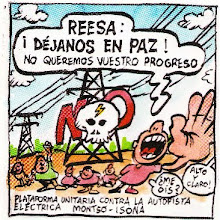A continuación, reproducimos el llamamiento que nos ha llegado de la International Electro-Magnetic Fields Alliance acerca de la urgente necesidad de rebajar los estándares de exposición pública a la contaminación electromagnética, que, pese a las pretensiones de Red Eléctrica de España y otras grandes empresas, son en general, excesivamente permisivos de acuerdo con los últimos estudios científicos, que confirman los graves daños a la salud (como leucemias infantiles, entre otros) que generan los campos electromagnéticos, entre ellos, de manera significativa por sus enormes dimensiones, los producidos por líneas de alta y muy alta tensión (como es el caso de la Autopista Eléctrica, línea a doble circuito de 400.000 voltios).
Podéis encontrar al pie del texto el enlace para apoyar esta campaña con vuestra firma.
A continuació, reproduïm la crida que ens ha arribat de la International Electro-Magnetic Fields Alliance sobre la urgent necessitat de rebaixar els estàndards d'exposició pública a la contaminació electromagnètica, que, malgrat les pretensions de Red Eléctrica de España i altres grans empreses, són en general, excessivament permissius d'acord amb els últims estudis científics, que confirmen els greus danys a la salut (com a leucèmies infantils, entre uns altres) que generen els camps electromagnètics, entre ells, de manera significativa per les seves enormes dimensions, els produïts per línies d'alta i molt alta tensió (com és el cas de l'Autopista Elèctrica, línia a doble circuit de 400.000 volts).
Podeu trobar al peu del text l'enllaç per recolzar aquesta campanya amb la vostra signatura.
Urgent Need for
Biologically-based EMF
Public Exposure Standards
*** Your Voice Counts ***Please sign this very important Biologically based EMF petition by adding your name and broadly distributing the link to all of your contacts and friends.
Petition:
"We, the undersigned, find that current national government as well as international authority limits do not protect the general public from adverse health effects from electromagnetic fields (EMF) emanating from devices such as power lines, cell phones and all wireless Internet devices and their associated antenna sites. Most of the existing limits on this form of radiation are at a minimum 1 to 10 thousand times too lenient to prudently protect humans from adverse health effects ranging from Alzheimer's and other neurodegenerative diseases, reproduction problems, sleep quality reduction, learning and memory interference, slowed ability of the body to repair damage, immune function decrease, cancer and electrohypersensitivity. Based upon the scientific evidence set forth in The Seletun Statement and the BioInitiative Report."
http://international-emf-alliance.org
The Seletun Scientific Panel acknowledges that numeric limits derived here for new biologically-based public exposure standards are still a billion times higher than natural EMF levels at which all life evolved. It is a serious mistake to believe that we have always lived in man-made electromagnetic fields, such as from electrical power, radio, TV, computers, and wireless telecommunication, and therefore should not worry. It was not long ago when people thought that X-rays, radioactivity, strong ultraviolet light and radar were completely without harm. Nowadays we know much better!
10 Key Points from Seletun Statement:
1. The Global Population Is At Risk. Global populations are not sufficiently protected from electromagnetic fields (EMF) from emerging communication and data transmission technologies that are being deployed worldwide, affecting billions of people;
2. Sensitive Populations Are Currently Vulnerable. Sensitive populations (for example, the elderly, the ill, the genetically and/or immunologically challenged) and children and fetuses may be additionally vulnerable to health risks; their exposures are largely involuntary and they are less protected by existing public safety standards; and they may amount to 40-50% of the population;
3. Government Actions Are Warranted Now Based on Evidence of Serious Disruption to Biological Systems. The Seltun Scientific Panel urges governments to adopt an explicit statement that “the standard for judging and acting on the scientific evidence shall be based on prudent public health planning principles rather than scientific certainty of effect (causal evidence)”. Actions are warranted based on limited, or weak, scientific evidence, or a sufficiency of evidence – rather than a conclusive scientific evidence (causation or scientific certainty) where the consequence of doing nothing in the short term may cause irreparable public health and economic harm, where the populations potentially at risk are very large, where there are alternatives without similar risks, or where the exposures are largely involuntary;
4. The Burden of Proof for the Safety of Radiation-Emitting Technologies Should Fall on Producers and Providers Not Consumers. The Seletun Scientific Panel urges governments to make explicit that the burden of proof of safety rests with the producers and providers of EMF- producing technologies, not with the users and consumers.
5. EMF Exposures Should Be Reduced in Advance of Complete Understanding of Mechanisms of Action. EMF exposures should be reduced now rather than waiting for proof or understanding of mechanisms of harm before acting. This recommendation is in keeping with traditional public health principles, and is justified now given abundant evidence that biological effects and adverse health effects are occurring at exposure levels many orders of magnitude below existing public safety standards around the world;
6. The Current Accepted Measure of Radiation Risk—the Specific Absorption Rate (‘SAR’)—Is Inadequate, and Misguides on Safety and Risk. SAR is not an adequate approach to predict many important biologic effects in studies that report increased risks for cancer, neurological diseases, impairments to immune function, fertility and reproduction, and neurological function (cognition, behaviour, performance, mood status, disruption of sleep, increased risk for auto collisions, etc);
7. An International Disease Registry Is Needed To Track Time Trends of Illnesses to Correlate Illnesses with Exposures. The Seletun Scientific Panel recommends an international registry be established to track time-trends in incidence and mortality for cancers and neurological and immune diseases. Tracking effects of EMF on children and sensitive EHS populations is a high priority. There should be open access to this information;
8. Pre-Market Health Testing and Safety Demonstration of All Radiation-Emitting Technologies. There is a need for mandatory pre-market assessments of emissions and risks before deployment of new wireless technologies. There should be convincing evidence that products do not cause health harm before marketing;
9. Parity Needed for Occupational Exposure Standards. The Panel discourages use of more lenient public safety standards for workers, as compared to the general public. Separate safety limits are not ethically acceptable. Workers include women of childbearing age and men who wish to retain their fertility;
10. Functional Impairment Designation for Persons with Electrohypersensitivity. The Panel strongly recommends that persons with Electrohypersensitivity symptoms (EHS) be classified as functionally impaired rather than with ‘idiopathic environmental disease’ or similar indistinct categories. This terminology accepts responsibility for the environmental cause of the related health challenges and will encourage governments to make adjustments in the living environment to better address social and well-being needs of this subpopulation of highly sensitive members of society.
The authors: Olle Johansson Chair, Adamantia Fragopoulou, Yuri Grigoriev, Lukas Margaritas, Lloyd Morgan, Elihu Richter and Cindy Sage.
Poll from IEMFA website 2011-2012















































































No hay comentarios:
Publicar un comentario